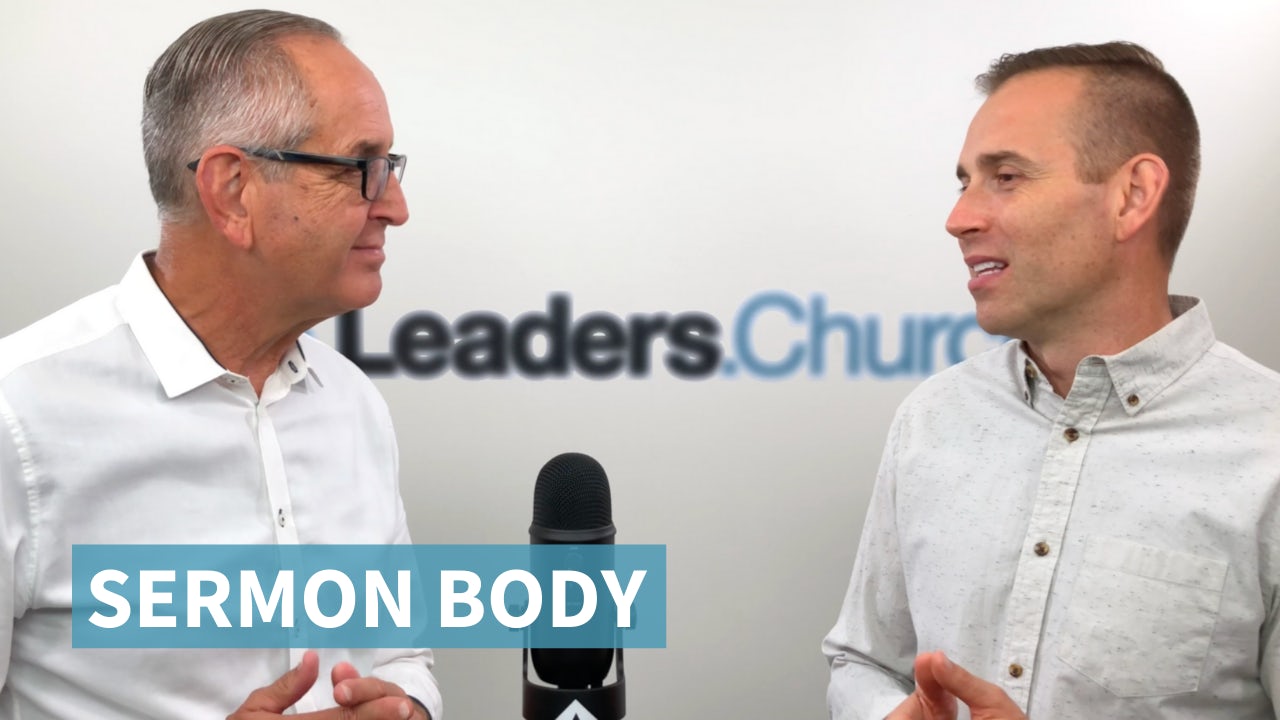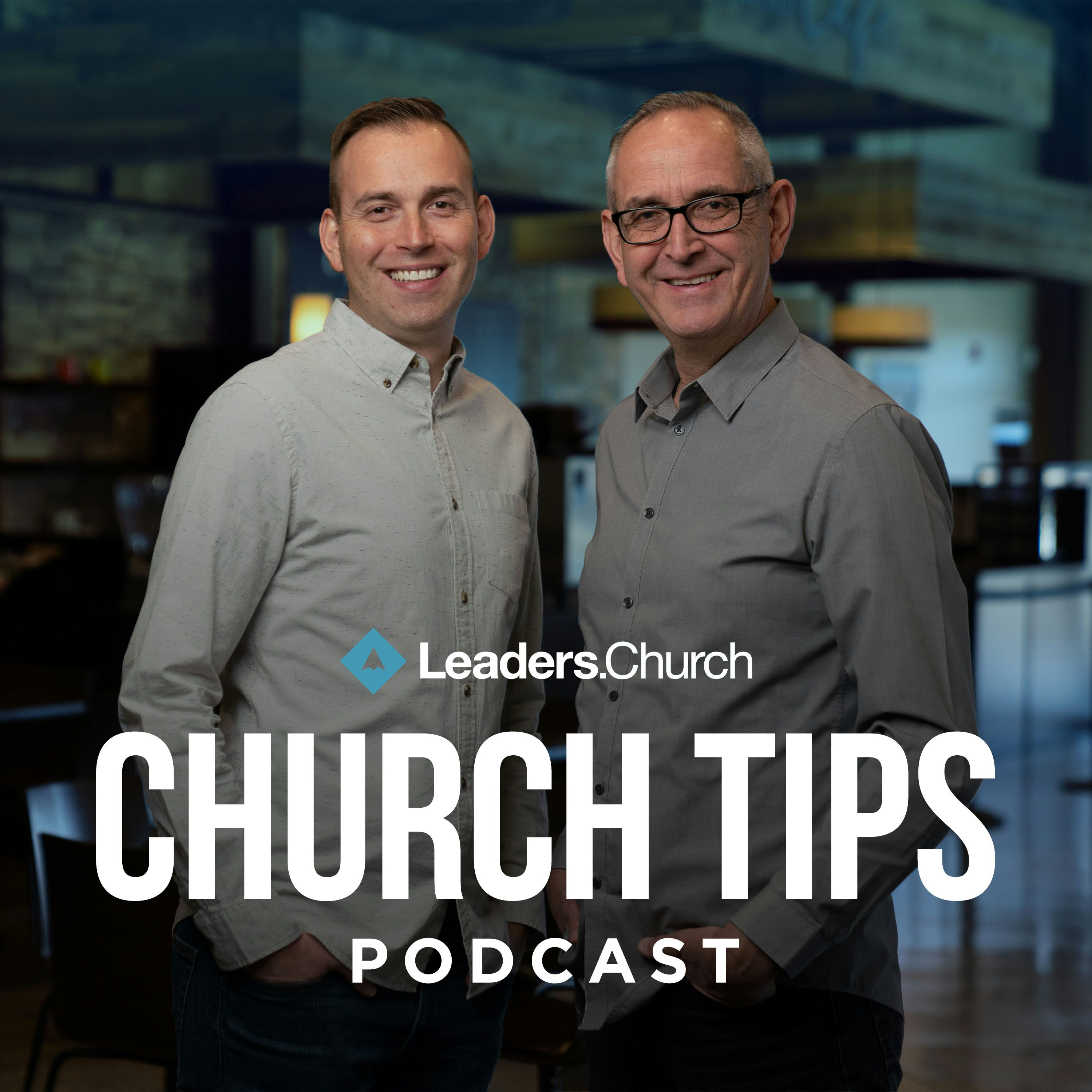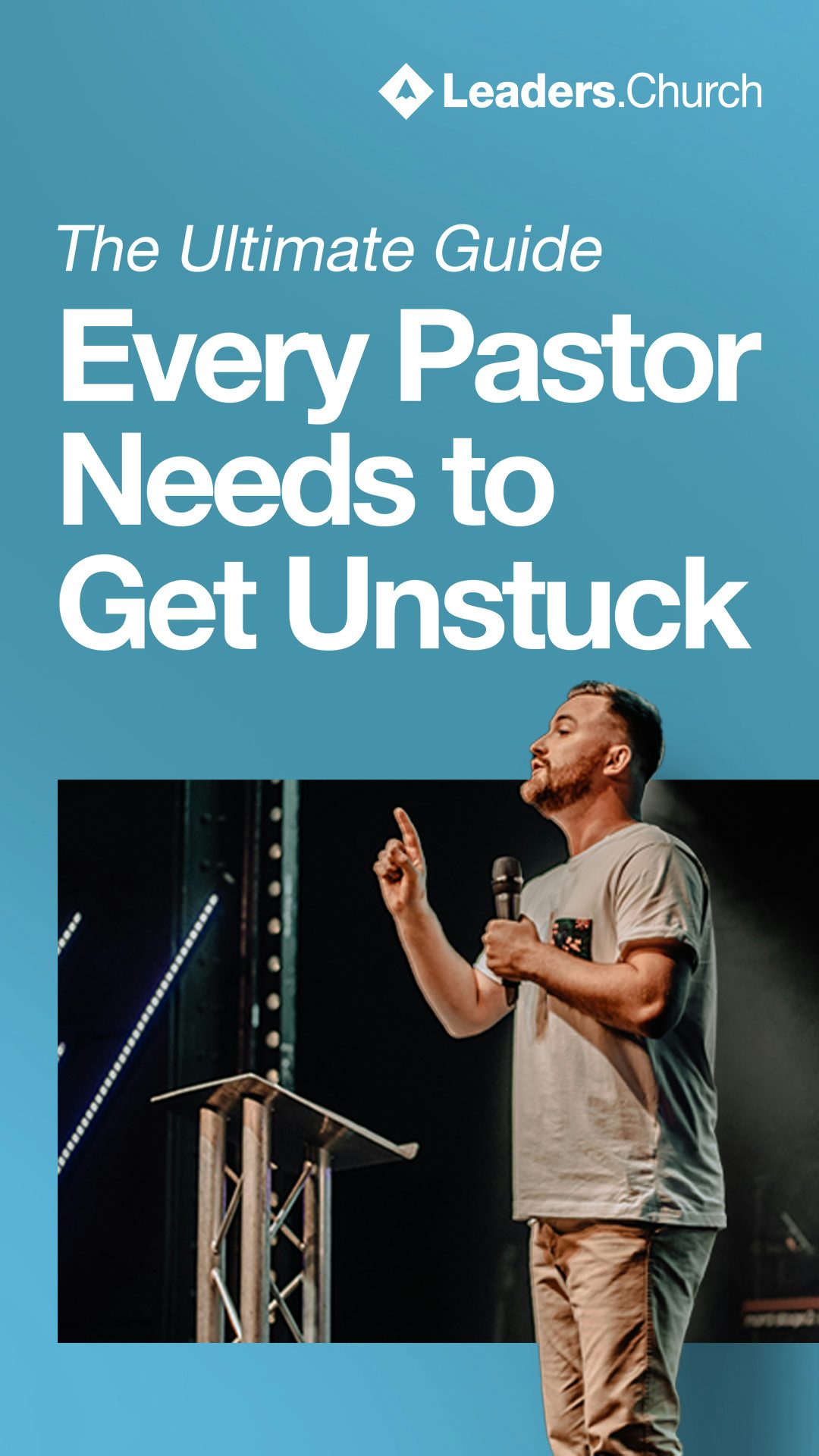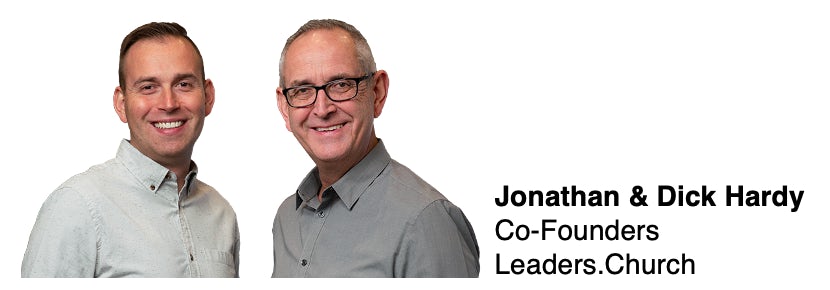078 – Sermon Body
What’s in this Episode?
Okay, I know exactly where I’m going to start this sermon. And frankly, I think I’ve got a great ending. But building the body of the message, man, I’ve got to get the good content to make this message, the best it can possibly be. I mean, where in the world am I gonna start with that? Well, in today’s episode of the Church Tips podcast, we’re going to talk about exactly that. Here we go.
Read the Transcript
Jonathan Hardy 0:27
Hey, we want to welcome you today. And in this episode, we’re going to be continuing our discussion of sermon preparation and preaching, and the communication of God’s Word, and hopefully helping to give you some thoughts and ideas to how you can be more effective in your prep and your communication of the Word as you deliver messages. It doesn’t matter whether you’re a Youth Pastor, Senior Pastor, Children’s Pastor, whatever it might be for you, we can always be working to grow in our communication. We should strive to do that. I know you’re a big fan of of that. And so then last time, we talked a little bit about some of the intro that I used in the most recent sermon, I preached at a church in Kansas. And we’re going to kind of use that as a little bit of a case study as we keep talking through today.
Jonathan Hardy 1:09
Yeah. Well, that’s great that way. So I really do encourage you to go back and take a look at Episode 77. And then the next one we do, that was talking about the intro, where he talked about his intro. And then the next one, following this one, we’ll talk about the conclusion. But this one today, we want to talk to Jonathan about the components of putting together the body of his message. So, this is the heart and soul of what you’re talking about Sunday in and Sunday out. So, we’re gonna jump right in. Of course, you have this recent example where you preached over in Kansas. Talk to us a little bit about how did you get your text? How did that come together for you?
Jonathan Hardy 1:48
Well, I first prayed. And that’s a good start thing to do. Yeah, just to make sure I had a thought in my mind. But before I executed and started preparing for that particular message, I wanted to pray. And it resonated with what I was thinking. And so, that may have been the Lord or may have just been, you know, in circumstances. But it’s the text that I’m actually writing a book about. And so, you know, that we’re in the process of writing a book. And so we’re excited to tell our listeners more about that here, hopefully, in the months to come. So, working on this first book, and I was, you know, writing about this kind of as the main gist of the book. And that just was resonating with what I felt like I was supposed to share. And I think with the time of life right now kind of coming on the heels of the whole COVID-19, and a lot of the just kind of the craziness of 2020. And it just it was like a message I felt like, I think this is the right message. And so, that’s really bottom line, what happened for me. I just prayed and, you know, circumstances with what I personally was doing, it resonated. Now, that’s because I was a guest speaker. And so, you know, that may not apply to you if you’re speaking regularly at your church. And so, I think when that point for those people that would be in that boat, you know, we have to think through, you know, obviously, praying is always the right thing to do. But is it serving to sermon development, in terms of like sermon series? Are you going through a book of Bible? I mean, those things are all I think, different ways people can put content together. We just have to go to the Lord and say, what is what is the right thing?
Dick Hardy 3:23
Well, you know, you mentioned then, that you had something in your heart that you felt would be right. You prayed. So, where does the where does the Holy Spirit, the anointing of the Holy Spirit come into play? You know, with our thoughts, our circumstances, what we think, and yet what the Holy Spirit is going to do? Where does that come into play in the development of the body of the sermon?
Jonathan Hardy 3:46
Well, the spiritual and the physical are not completely separate from one another. I mean, they’re not compartmentalized. They’re integrated together and everything in our life, that that’s how it works. And so, the way I view the walk of faith, just in general, is you take a step. God directs, you take a step. God directs, okay, take another step, God directs. And so, you know you have to act. And if you don’t act, then, you know, then it’s like, well, how is God gonna direct you and lead you? And so, for me, that’s basically how I viewed even the sermon planning. It’s like, “Well, okay, I feel like this is right. I’ve prayed about it. I don’t have the Lord saying, No, don’t do this.” If you have the Lord saying that, well, then obviously, you go a different direction and start all over. Right? But once you feel good about that, then it’s like, Okay, well, let me take a step. And so what would be the points? I originally started with mine having two points. And as I was going through, and I thought, you know, I think there’s a third point here. And so then I added the third point, started massaging it, and I manuscripted it. I just tend to do better when I actually manuscript it out. And not all people do that. But that for me, helps, because then I could start thinking through all the pieces of content within that. And so that’s kind of how that worked for me. You know, I was taking a step, and I was looking at it as like, I think I need to add. And so, I think the bottom line is to answer your question is this that merging of the physical, the natural, with the spiritual, and we have to maintain that sensitivity to the Lord, which happens through our time with prayer. So, every day, leading up to my time of speaking, I was really praying over that, and praying “God, is there anything I’m missing? What do you want me to say?” You know, I was praying that God would just breathe on me as I would type the words on the computer. And so it just all kind of works together.
Dick Hardy 5:33
Well, and what I hear from you, too, is you didn’t go into the preparation of this message, and then say, “Okay, now I’m going to live with spirit and physical together.” Your life is that. You live that way. And therefore, when you’re going, as a preacher going into the mechanics of preaching, creating this body of the message, it is part of you. Okay so, you mentioned you manuscript this. So, how do you know how much is too much? Or how much not enough?
Jonathan Hardy 6:06
Well, when you manuscript out, it’s a lot easier, because, you know, we live in a world where there’s a time clock, in the western world, at least. And so, attention spans are only so long. And you know, of course, I was a guest speaker. And whether you’re a guest speaker, or whether you are preaching regularly, you you have a clock. And you know, there is a certain amount of time I have to speak. And so, obviously, if your manuscripting, it’s pretty easy, because then you know, you can even practice and in fact, I’ve a pastor friend of mine, who, every Saturday, he actually goes up to the church and practices his entire message before the Sunday. And I was like, that’s actually smart. And he’s a lead pastor at a church. And it’s a way for him to get a rep in. And also gives them a chance to just see how it comes out. And if there’s anything that as he’s as he’s actually communicating it, if it’s maybe like, “Oh, I think that’s probably not gonna resonate right.” You know, so I think I was like, “Oh, that’s really good.” And he’s been preaching for a long time. This is not like this is some guy who’s just bringing a preacher. And I think that’s what’s just, you know, a little bonus tip here, that’s a helpful thing. Because then, you know, you’re getting that repetition in ahead of time before you actually are communicating it live. And so, that could be a way to answer or determine, “well, how long was it?” If you don’t manuscript, if you just work off bullet points.
Jonathan Hardy 7:25
Yeah, I remember one time, too, I was in a service, a special kind of service. It wasn’t a regular Sunday church service, where things had happened in the front end of the of the service itself that caused me to have to call an audible, within myself to shorten it up. And that is really tough. That is really tough for preachers who have really poured themselves into the meat of the message. But you’ve got to be sensitive to that. You know, you talked in the last episode of the intro, and the next one, where we’ve told folks, we’re going to talk about the outro, the conclusion, how do you come out of your intro into the body and then out of the body into the conclusion? We probably could do a whole episode on that. But, what are some things that pastors could be thinking about coming in and going out of the body?
Jonathan Hardy 8:19
Well, I didn’t talk about this in the previous episode 77. But one of the things I think is important, when it comes to the intro, is that it ties directly to what you’re about to communicate. And I think there’s times where I’ve seen where, you know, you kind of have some off the wall jokes, that really don’t have anything to do with the message. You’re trying to get people laughing you’re trying to get them light-hearted. And I get why. But I think a more effective approach is if you can come up with an illustration, a joke, a video or whatever, that’s going to be a direct correlation and move easily move right into the body. So, you know, I’ll use my example that I did, you know, I talked about the bow and arrow, and we had a funny video we talked about in the previous episode. And so, you know, I just said, “Hey, you know, did you know, there’s actually another use of a bow and arrow?” So, I was playing off the idea that, obviously, we know the practical use of the bow and arrow is the, you know, you shoot the arrow. Well, then there was the guy, the funny guy throwing an arrow. And I said, Well, there’s actually another use and so people are like, “What’s the next one?” Well, and then that’s when I segue. “It’s actually in the Bible.” And we talked about Second Kings 13 And so, the idea there is you want to you want to make it a very natural flow. I’m not, I am personally I’m just not the fan of, hey, well let me give you something, to tell you something funny gets you get you laughing. Then “Okay, well anyway, so let’s get down to business.” And it’s completely irrelevant. Let’s let’s just make it as natural as possible, which means it might not be something super funny on the front end. But if it’s going to be more meeting them where they are and tie better, I think that’s more effective.
Dick Hardy 9:54
Well, that’s that’s good coming in, then when when you’re getting ready to go out, are there any things you should should be thinking about as you’re winding the body down into the conclusion?
Jonathan Hardy 10:04
Well, the one thing that comes to mind as you say that, issummarize. So, before you even kind of try to wrap up whatever conclusion you’re going to give, I’m a big fan of a summary. And I think the effective amount of points is three to five points, max, five points. Because if you get too many points, and people can’t really get remember. And so, I think that’s something that’s important. And then to go back and repeat it. Because more times than not, and I’ve listened to, you know, hundreds of sermons. But more times than not, I find that pastors don’t always go back and summarize and repeat, as they get ready for the call to action in the conclusion. And so, it’s like, you’re on point three. Well, I don’t remember point one already. That is why you got to keep repeating over and over, point one, point two, point three, point four or whatever, however many you have. So that’s kind of how I tend to approach it.
Dick Hardy 10:58
That’s good. Well, give our viewers and listeners kind of a wrap up, Jonathan, in terms of the body of the message. What would you want them to take away out of this episode today?
Jonathan Hardy 11:08
Well, the body, obviously is the meat. That’s where we’re digging into the Scripture. And it’s so important. And I think the important thing to know is, you have to do all that you can to communicate the truth of God’s Word, and then ultimately have to rest that God is going to use what you say, and the Bible and the scriptures itself to speak to the hearts of people. Because we can do all we can. But ultimately, we have to give it to God and say, Okay, this is all I’ve got. Here’s what I can say. And we do it to the best of our ability. We don’t do it, you know, not doing sloppy, not sloppy, we’re not winging it. Right? You know, you put time into it, right? I know, a very, very, very well known pastor and author, who, the other day I heard him on a podcast say that he still puts in, you know, about 30 hours of prep for the messages he’s communicating. Now he manuscripts them, he really, you know, just comb over those things. And I mean, I was shocked, actually, when I heard it. I was like, how in the world could you do that? I can’t believe it, you know, and he’s putting in the time. And he’s an effective communicator. And in the world’s eyes, he would be considered a very successful pastor, an author. And so, I think it’s very important to put that prep time in for the body of what you’re going to be communicating.
Dick Hardy 12:28
That’s good. Well, again, friends, be sure to take a look at Episode 77, where Jonathan talked about the intro, had some fun with that, and it’s good content. And then keep your eyes peeled for the next episode, where we’re going to talk, here in the church tips podcast, we’re going to talk about conclusions. How do you actually bring this thing home for the response that you’re looking for? Well, I think we got some new stuff coming down the pike.
Jonathan Hardy 12:51
Well, one thing we want to mention is the newest course that we’ve released inside Church UniversitY. Church University is our online education for pastors. And this is a way for us to continue to help you elevate your different aspects of ministry leadership that you do. And one of the areas is in the preaching end. And so, we have a new preaching track. It’s an online course, 42 videos or so. It’s basically online education. So I mean, it would be likened to a college level, seminary level preaching course, for you, that you could jump in get access to. Right now, it’s available at two-thirds off. And so, this is a steal of a deal during our launch week here, as we just are releasing this new course this week. And so. you want to dive in if you can. We cover all kinds of aspects of preaching. And one of the benefits of this particular course, is that not only can you personally use it, but you can use it to develop other communicators in the church. So, whether that’s a Youth Pastor, a Children’s Pastor, maybe someone else that you want to have fill in once in a while, when sometimes board members will preach or you have other people. Where you can, you know, hopefully, get a couple of people to come alongside you and can go through the content. They can have their own access to the content, and you can be not only investing in you to help your preaching go to the next level, but you can also do that with others there in the church.
Dick Hardy 14:07
Yeah, that is so good. That is so good. Well, we’re excited about it. Just go to churchuniversity.com and scroll down to the very first icon there. It’s the preaching track, and we’d love to have you take a look at it. Anything else, Jonathan?
Jonathan Hardy 14:18
That’s it.
Jonathan Hardy 14:19
I think we’re good to go. Thanks so much for hanging out with us today. Make it a great one, and be blessed.
Jonathan Hardy 14:23
Hey Jonathan, here. Real quick before you go. Everything in your ministry rises and falls on your leadership. So investing in your leadership is essential to staying healthy and growing the ministry. And that’s why I want to invite you to join us inside the leaders.church membership. This online streaming service for pastors gives you access to more than 300 videos, plus training material to level up your leadership and improve your ministry skills. If you’d like to do that, I want to invite you to go to leaders.church/boost. Again, that’s leaders.church/boost. Well, thanks again for joining us on the Church Tips Podcast. We’ll look forward to seeing you next time.
Subscribe & Follow:
- Subscribe on Apple Podcasts
- Follow on Spotify
- Subscribe to YouTube Channel
- Subscribe on Google Podcasts
- Like us on Facebook
- Follow us on Instagram
- Follow us on Twitter
Other Resources:
- Leaders.Church
- Leaders.Church Blog
- Church University
- Take the Free 5 Day Leadership Challenge for Pastors
- Get Free Access to the 4 Secrets Masterclass









